Related Research Articles
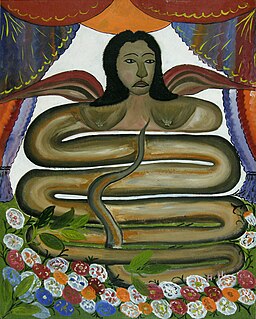
Lwa, also called loa or loi, are spirits in the African diasporic religion of Haitian Vodou. They have also been incorporated into some revivalist forms of Louisiana Voodoo. Many of the lwa derive their identities in part from deities venerated in the traditional religions of West Africa, especially those of the Fon and Yoruba.

Vodun is a religion practiced by the Aja, Ewe, and Fon peoples of Benin, Togo, Ghana, and Nigeria.

Papa Legba is a lwa in Haitian Vodou, who serves as the intermediary between the lwa and humanity. He stands at a spiritual crossroads and gives permission to speak with the spirits of Guineé, and is believed to speak all human languages. In Haiti, he is the great elocutioner. Legba facilitates communication, speech, and understanding. He is commonly associated with dogs. Papa Legba is invoked at the beginning of every ceremony. Papa Legba has his origins in the historic West African kingdom of Dahomey, located within present-day Benin.

Hoodoo is a set of spiritual practices, traditions, and beliefs which were created and concealed from slaveholders by enslaved Africans in North America. Hoodoo evolved from various traditional African religions and practices, and in the American South, incorporated various elements of indigenous botanical knowledge. Hoodoo is an African Diaspora tradition created during the time of slavery in the United States, and is an esoteric system of African-American occultism. Many of the practices are similar to other African Diaspora traditions as the practices come from the Bakongo people in Central Africa. During the transatlantic slave trade, about 40 percent of Africans taken to the United States were Bantu-Kongo. Hoodoo is a syncretic spiritual system that combines Christianity, Islam brought over by enslaved West African Muslims, and Spiritualism. This tradition is part of the African-American cultural heritage of spirituality and religion. Following the Great Migration of African-Americans, Hoodoo spread throughout the United States. Practitioners of Hoodoo are called rootworkers, conjure doctors, conjure man or conjure woman, root doctors, Hoodoo doctors, and swampers. Regional synonyms for Hoodoo include conjure or rootwork.
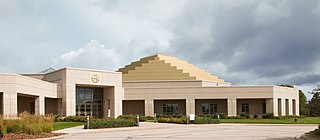
Eckankar is a new religious movement founded by Paul Twitchell in 1965. Its membership today is primarily in the United States. The spiritual home is the Temple of Eck in Chanhassen, Minnesota. Eckankar is not affiliated with any other religious group.
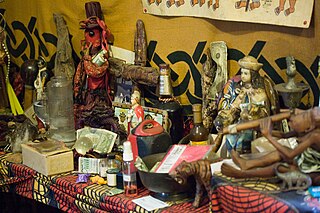
African diaspora religions are a number of related religions that developed in the Americas in various nations of the Caribbean, Latin America and the Southern United States. They derive from traditional African religions with some influence from other religious traditions, notably Christianity and Islam.
Voodoo may refer to:
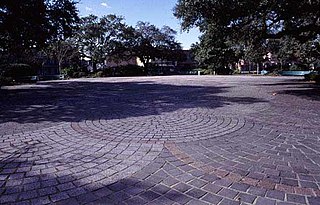
Congo Square is an open space, now within Louis Armstrong Park, which is located in the Tremé neighborhood of New Orleans, Louisiana, just across Rampart Street north of the French Quarter. The square is famous for its influence on the history of African American music, especially jazz.
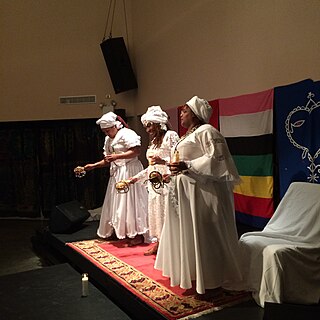
A manbo is a priestess in the Haitian Vodou religion. Haitian Vodou's conceptions of priesthood stem from the religious traditions of enslaved people from Dahomey, in what is today Benin. For instance, the term manbo derives from the Fon word nanbo. Like their West African counterparts, Haitian manbos are female leaders in Vodou temples who perform healing work and guide others during complex rituals. This form of female leadership is prevalent in urban centers such as Port-au-Prince. Typically, there is no hierarchy among manbos and oungans. These priestesses and priests serve as the heads of autonomous religious groups and exert their authority over the devotees or spiritual servants in their hounfo (temples).

The Canal Street Ferry, also known as the Algiers Ferry, is a ferry across the Mississippi River in the U.S. state of Louisiana, connecting the foot of Canal Street in the Central Business District of New Orleans with Algiers on the West Bank. It carries pedestrians only for $2.00 one way. This increase in price from (formerly) free took effect February 23, 2014. The Crescent City Connection Division of the Louisiana Department of Transportation and Development operates the ferry. Ferries depart daily from the West Bank on the hour and half hour, beginning at 6 a.m. (06:00) Departures from the East Bank are on the quarter-hour and three quarters hour, the last leaving at 12:15 a.m. (00:15).
Priestess Miriam Chamani is the Mambo (Mother/Priestess) and co-founder of the New Orleans Voodoo Spiritual Temple.
Louis Martinié is an author, "internationally known" percussionist, practitioner of a multitude of religions among them being New Orleans style Voodoo, and co-author of the book New Orleans VooDoo Tarot (1992), with Sallie Ann Glassman.

Sallie Ann Glassman is an American practitioner of Haitian Vodou, a writer, and an artist. She was born in Kennebunkport, Maine and is of Jewish—Ukrainian heritage.

The Voodoo Music + Arts Experience, commonly referred to as Voodoo or Voodoo Fest, is a multi-day music and arts festival held in City Park in New Orleans, Louisiana.

Louisiana Voodoo, also known as New Orleans Voodoo, is an African diasporic religion which originated in Louisiana, now in the southern United States. It arose through a process of syncretism between the traditional religions of West Africa, the Roman Catholic form of Christianity, and Haitian Vodou. No central authority is in control of Louisiana Voodoo, which is organized through autonomous groups.
Spiritualism is a metaphysical belief that the world is made up of at least two fundamental substances, matter and spirit. This very broad metaphysical distinction is further developed into many and various forms by the inclusion of details about what spiritual entities exist such as a soul, the afterlife, spirits of the dead, deities and mediums; as well as details about the nature of the relationship between spirit and matter. It may also refer to the philosophy, doctrine, or religion pertaining to a spiritual aspect of existence.
The culture of Louisiana involves its music, food, religion, clothing, language, architecture, art, literature, games, and sports. Often, these elements are the basis for one of the many festivals in the state. Louisiana, while sharing many similarities to its neighbors along the Gulf Coast, is unique in the influence of Cajun culture, due to the historical waves of immigration of French-speaking settlers to Louisiana. Likewise, African-American culture plays a prominent role. While New Orleans, as the largest city, has had an outsize influence on Louisiana throughout its history, other regions both rural and urban have contributed their shared histories and identities to the culture of the state.
Marie Thérèse Alourdes Macena Champagne Lovinski (1933–2020), also known by the name Mama Lola, was a Haitian-born manbo (priestess) in the African diasporic religion of Haitian Vodou. She had lived in the United States since 1963.
New Orleans Historic Voodoo Museum is a voodoo museum in New Orleans, United States, situated between Bourbon and Royal Streets in the centre of the French Quarter. Although only a small museum, consisting of two rooms, it is one of few museums in the world dedicated entirely to Vodou art. There is a voodoo priest on site giving readings. Separately, the museum also hosts walking tours to the Marie Laveau tomb in the Saint Louis Cemetery and the Congo Square.
References
- ↑ Planet, Lonely. "Voodoo Spiritual Temple in New Orleans, USA". Lonely Planet. Retrieved 2017-02-25.